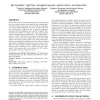Free Online Productivity Tools
i2Speak
i2Symbol
i2OCR
iTex2Img
iWeb2Print
iWeb2Shot
i2Type
iPdf2Split
iPdf2Merge
i2Bopomofo
i2Arabic
i2Style
i2Image
i2PDF
iLatex2Rtf
Sci2ools
SIGIR
2008
ACM
2008
ACM
Evaluation over thousands of queries
Information retrieval evaluation has typically been performed over several dozen queries, each judged to near-completeness. There has been a great deal of recent work on evaluation over much smaller judgment sets: how to select the best set of documents to judge and how to estimate evaluation measures when few judgments are available. In light of this, it should be possible to evaluate over many more queries without much more total judging effort. The Million Query Track at TREC 2007 used two document selection algorithms to acquire relevance judgments for more than 1,800 queries. We present results of the track, along with deeper analysis: investigating tradeoffs between the number of queries and number of judgments shows that, up to a point, evaluation over more queries with fewer judgments is more costeffective and as reliable as fewer queries with more judgments. Total assessor effort can be reduced by 95% with no appreciable increase in evaluation errors. Categories and Subject D...
Related Content
| Added | 15 Dec 2010 |
| Updated | 15 Dec 2010 |
| Type | Journal |
| Year | 2008 |
| Where | SIGIR |
| Authors | Ben Carterette, Virgiliu Pavlu, Evangelos Kanoulas, Javed A. Aslam, James Allan |
Comments (0)

